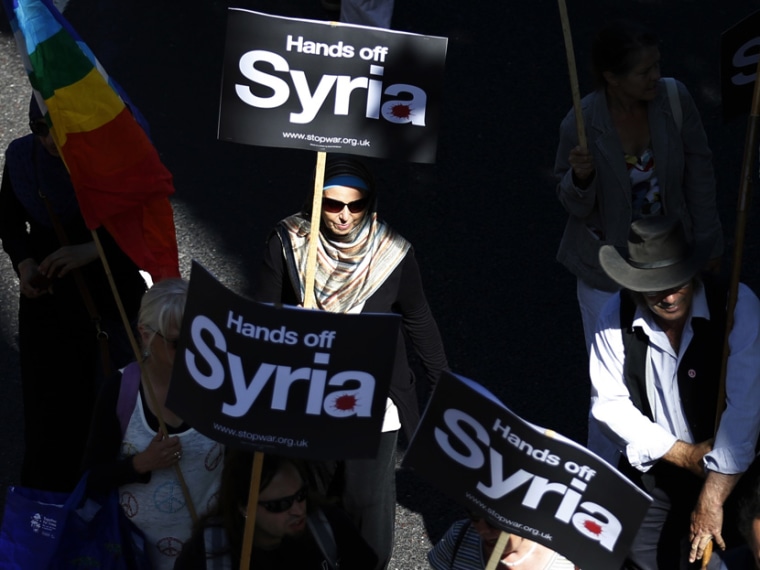Blood and hair samples taken from East Damascus by first responders have tested positive for signs of sarin gas, Secretary of State John Kerry said on Meet the Press on Sunday.
"In the last 24 hours, we have learned through samples that were provided to the United States that have now been tested from first responders in east Damascus and hair samples and blood samples have tested positive for signatures of Sarin," Kerry told NBC's David Gregory.
Sarin is a highly toxic, man-made chemical nerve agent that can be used as both a liquid and a gas. When used it large doses, it can cause paralysis, loss of consciousness, respiratory problems, and death. The Aum Shinrikyo cult used Sarin gas in a terrorist attack on the Tokyo subway system in 1995.
Kerry denied that he was opposed to seeking approval from Congress for a strike against Syria and said he believed Congress would vote to allow the use of force. He also acknowledged that the U.S. wants to see an end to Assad's regime, although he insisted that immediate military action should not be "more than an effort to try to deter and prevent the use of chemical weapons and to degrade his capacity to use those weapons."
Kerry's appearance on the Sunday morning talk shows was part of the White House's "flood the zone" strategy for making the case on Syria, NBC News reported. Administration officials, including Vice President Joe Biden, spent the day making individual phone calls to House members and Senators. President Obama also invited the chairs and ranking members of national security committees to meet with him at the White House on Tuesday.
Friday, Kerry had made an impassioned case for striking Syria, arguing that inaction on the part of the U.S. would set a bad precedent in the region.
“A lot of other countries whose policies challenge these international norms are watching," he said.
In a speech Saturday, President Obama tonedsaid that while he has decided to strike in Syria, he will first seek authorization from Congress. The announcement was welcomed by Republican leadership and had the support of British Prime Minister David Cameron, but was sharply criticized within Syria. Rebel forces there told NBC News that, "President Obama is sending contradictory messages, he promised to help, and now promises delays.”
Syrian government forces resumed shelling shortly after Obama's speech, witnesses told NBC News.
The proposed Authorization for the Use of Military Force would allow military actions to “prevent or deter the use or proliferation (including the transfer to terrorist groups or other state or non-state actors), within, to or from Syria, of any weapons of mass destruction, including chemical or biological weapons or components of or materials used in such weapons." Jack Goldsmith, former Special Counsel to the Office of Legal Counsel, pointed out the authorization does not limit the United States to specific targets or locations.
"I think this is a very powerful case and the president is confident that as that case is presented to the United States Congress and the American people, people will recognize that the world cannot stand aside and allow an Assad or anybody else to break a almost 100-year-old acceptance," Kerry said.
Sunday morning Pope Francis called for a day of fasting and praying for peace in support of Syria.
"With utmost firmness I condemn the use of chemical weapons," the pope said. "I tell you that those terrible images from recent days are burned into my mind and heart. There is a judgment of God and of history upon our actions which are inescapable! Never has the use of violence brought peace in its wake. War begets war, violence begets violence."
